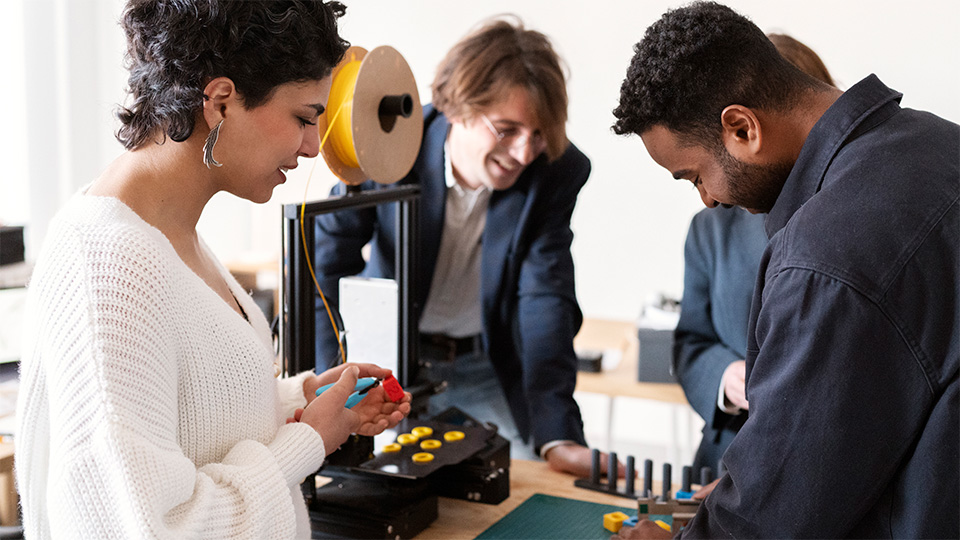
Digital Scholarship Lab Workshop Series
The Digital Scholarship Lab at Milner Library serves as a hub for the exploration and application of digital technologies and methodologies. This spring, the lab will offer four workshops designed to provide participants with an introduction of these technologies, and to explore their potential applications in teaching, research, and project development.
Workshops
A Gentle Introduction to VR & AR
Register for this session by Thursday, February 6
Synchronous Session:
Friday, February 7 • 2 p.m. to 4 p.m.
Location:
Digital Scholarship Lab, Milner Library 165
Facilitator:
Roy Magnuson, Milner Library
Unclear on the difference between Virtual Reality (VR) and Augmented Reality (AR)? Unclear on what AR is good for other than catching virtual Pokémon? Join us for this workshop to learn about what these technologies are, how they have been used, and what possibilities they hold for future projects and research. Registration Required
Intended Audience: Tenure-Track Faculty, Non-Tenure Track Faculty, Course Instructors, Graduate Students, Staff (AP and Civil Service).
Introduction to 3D Printing
Register for this session by Thursday, February 20
Synchronous Session:
Friday, February 21 • 2 p.m. to 4 p.m.
Location:
Digital Scholarship Lab, Milner Library 165
Facilitator:
Sean Winslow, Milner Library
3D printing and other “additive manufacture” technologies seem to be everywhere today, but what does one need to get started? In this introductory workshop, we will present the tools and software required for 3D printing, how to get started, demo the process, and participants will learn how to use resources to find publicly available files and request their printing through Milner Library services. Registration Required.
Intended Audience: Tenure-Track Faculty, Non-Tenure Track Faculty, Course Instructors, Graduate Students, Staff (AP and Civil Service).
Introduction to Creating Digital Collections and Exhibits with Omeka
Register for this session by Thursday, March 20
Synchronous Session:
Friday, March 21 • 2 p.m. to 4 p.m.
Location:
Digital Scholarship Lab, Milner Library 165
Facilitator:
Rebecca Fitzsimmons, Milner Library
Omeka in the classroom: Creating digital collections and exhibits
Omeka is an open source, flexible, and easy-to-use platform that has many potential applications for teaching and scholarship. It contains various tools for populating curated collections of text, images, audio, and video; creating digital exhibits; annotating text and images; and more.
With the ability to assign and manage different user roles, Omeka works well in the classroom for standalone digital humanities assignments, semester-long group collaborations, or ongoing projects. It is also flexible enough for researchers across disciplines to support their own digital scholarship and digital humanities projects.
In this workshop, participants will learn some of the basic and intermediate functions of Omeka and brainstorm project ideas. Registration is required.
Intended Audience: Tenure-Track Faculty, Non-Tenure Track Faculty, Course Instructors, Graduate Students, Staff (AP and Civil Service).
Introduction to Metadata for Digitization Projects
Cancelled
Synchronous Session:
Thursday, April 10 • 2 p.m. to 4 p.m.
Location:
Digital Scholarship Lab, Milner Library 165
Facilitators:
Emily Baldoni, Milner Library
Angela Yon, Milner Library
Maddi Loiselle, Milner Library
Metadata is a crucial tool for organizing and understanding digitized data, but can be daunting due to the number of choices available: how does one decide what is important and what can be discarded? What standards are appropriate for projects? How can we plan metadata creation to support scholarships down the road? Milner Library's Metadata team will help participants navigate this broad topic, fostering a focused understanding of how metadata can work in the real world on your projects. Registration Required
Intended Audience: Tenure-Track Faculty, Non-Tenure Track Faculty, Course Instructors, Graduate Students, Staff (AP and Civil Service).